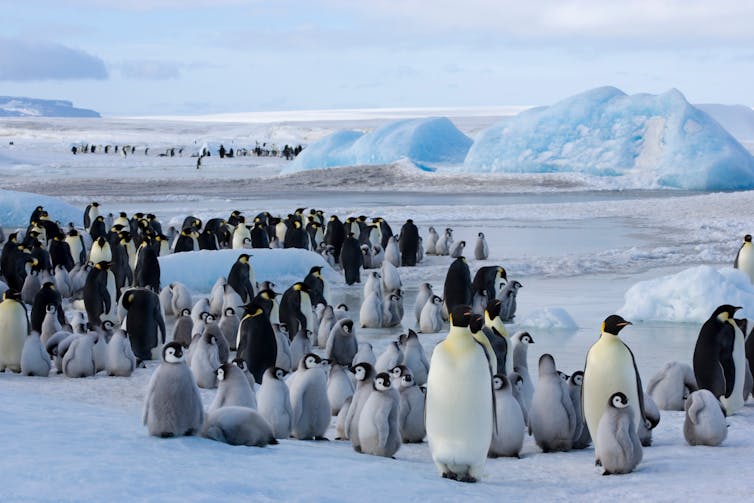As Antarctic sea ice shrinks, iconic emperor penguins are in more peril than we thought
- Written by The Conversation

When winter comes to Antarctica, seals and Adélie penguins leave the freezing shores and head for the edge of the forming sea ice. But emperor penguins stay put.
The existence of emperor penguins seems all but impossible. Their lives revolve around seasons, timing and access to “fast ice” – sea ice connected to the Antarctic coast. Here, the sea ice persists long enough into summer for the penguins to rear their chicks successfully.
But climate change is upending the penguins’ carefully tuned biological cycles. The crucial sea ice they depend on is melting too early, plunging the chicks from some colonies into the sea before they are fully fledged.
In the latest bad news for these penguins, research by the British Antarctic Survey examined satellite images from 2009 to 2024 to assess fast-ice conditions at 16 emperor penguin colonies south of South America. They noted an average 22% fall in numbers across these colonies. That translates to a decrease of 1.6% every year.
This rate of loss is staggering. As the paper’s lead author Peter Fretwell told the ABC, the rate is about 50% worse than even the most pessimistic estimates.
Breeding while it’s freezing
Just like polar bears in the Arctic, emperor penguins are the iconic species threatened by climate change in Antarctica.
Emperor penguins are a highly successful species. They’re the tallest and heaviest penguin alive today. They evolved about one million years ago, and are highly adapted to life in one of Earth’s harshest environments. As of 2009, the emperor penguin population was estimated at just shy of 600,000 birds.
Unfortunately, they are now in real trouble, because their breeding habitat appears to be reducing.
At the beginning of every Antarctic winter, the surface of the ocean begins to freeze and sea ice forms. Over March and April, emperor penguins aggregate into raucous breeding colonies along the coast of the ice continent. They need about nine months to care for their chicks, until the young penguins can go to sea and look after themselves.
The males frequently huddle to keep each other warm and their eggs safe. Meanwhile, the females spend months at sea catching krill, squid and fish, returning in July/August to feed their hungry chicks. When summer finally comes in December, the chicks start to shed their down and grow a dense, waterproof plumage – like a feathery armour against the intensely cold seas off the icy continent.
Breeding locations are a kind of “Goldilocks” zone. When choosing a home, the penguins have to find a place that is safe but not too far from the fast ice edge where they go to start hunting.
The greater the distance they have to travel, the longer it takes to return to their offspring, and the chicks may miss out on meals. But if a colony is too close to the edge of the fast ice, the risk increases that the ice breaks up before the chicks are ready to go to sea. Although fast ice can cover vast areas of the ocean surface, its edge is exposed to the swell of the Southern Ocean.
In recent years, the fast ice in different parts of Antarctica has been breaking up early, before the chicks have moulted into their adult plumage. Without waterproof plumage, chicks perish because the cold water kills quickly. As this happens more often, the size of a colony shrinks.
How bad is it?
We don’t yet know if this rate of loss is happening right across Antarctica. The study only covers a the part of the continent that includes the Antarctic Peninsula and the Weddell Sea.
What we do know is that Antarctica and its unique biodiversity are not immune to the consequences of still-rising global greenhouse gas emissions.
In 2021, emperor penguins were listed as endangered by the United States, because the risk of extinction by century’s end had increased. Australia has not yet listed the emperor penguin as a threatened species.
The new research suggests the future of these iconic birds is not looking good. Until the world gets serious about cutting greenhouse gas emissions, sea ice will retreat – and more chicks will fall into the icy water before they are ready to launch.
Seabird ecologist Dr Barbara Wienecke contributed to this article.







